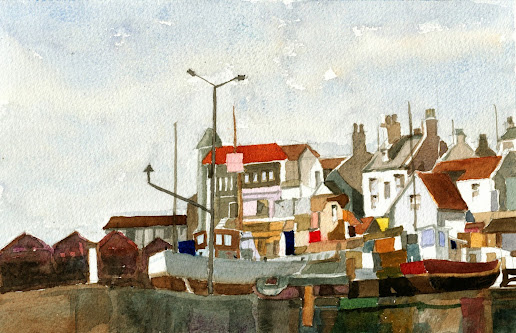My Handicaps
Early in my life I was severely handicapped with a squint or ‘lazy eye’ as it was called then. From the age of four when my mother was obliged to face the fact that I actually had a squint I spent three years in going to the Moorfields Eye Hospital by bus at least once a week to try to remedy the situation. When I was six I was operated on to shorten the outside muscle of the eye to pull it straight. This made me look like everybody else for a change but it did not cure the main result of the problem, the lack of binocular vision. The experts were pleased to note that I did not have double vision.
Of course the result was quite extreme, it left me with a wide field of vision but little ability to judge depth. It meant that I could never catch a ball or hit anything in the air and coming towards me.
I was always the last to be picked for team games, it was obvious that I was no good if it involved any kind of depth perception.
Sport had no attraction for me so much social life was closed to me in our competitive society. It’s not surprising therefore that I became a bit of an introvert.
I was a great reader however and thanks to a very good Carnegie library in Fulham I read many books. Adults members were given four fiction tickets and four non-fiction tickets. My mother read only fiction so I was able to use her four non-fiction tickets as well as my two children’s library ones.
My reading was extensive, liberal and unusually available to one of my tender years, I read anything that took my interest and the library had a huge non-fiction section.
Even though I wore glasses for many years I did not suffer any bullying because as a consequence of all this reading other children regarded me as a sort of useful asset, I was called The Professor.
The difficulty in drawing of making the conversion between three dimensions and two was not one that I ever had, I drew consistently through my whole childhood. When visiting relatives and sitting with all the adult family conversations going on around me it was generally known that supplying me with pencil and paper would keep me happily occupied and out of trouble.
For many years I believed that I was disadvantaged and there is no doubt on looking back that my whole career was eventually shaped by this condition. I was not surprised to find when studying on my Art Teachers’ Training course that 60% of the intake were suffering from a eye problem of one sort or another, usually short-sightedness. I later learned that could be paralleled in the sports/athletics field where a large number of leading athletes had suffered one kind or another of physical illnesses or physically limiting conditions in earlier life.
As a teacher, having a wide monocular field of sharp vision had real advantage for a teacher. It was easy to spot movement at the extreme periphery of vision and earned me the pupil reputation of ‘having eyes in the back of of my head.’
Without this particular start in life it is difficult to think of any different outcome than as an Art teacher and eventually an Art Lecturer.








